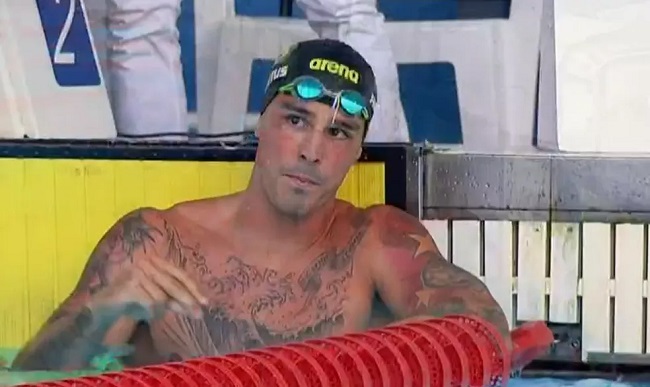Bruno Fratus, a famous swimmer from Brazil, is a born competitor who loves to prove his sceptics wrong. The 50-meter freestyle ace is a two-time individual world silver medalist and a leading contender to take gold at the 2020 Olympic Games in Tokyo. However, he has faced and overcome significant challenges on his route to the top.
B. Fratus Olympic Games Tokyo 2020
The two-time Olympian is shorter than other top swimmers, therefore he had to develop strategies to equal their swimming efficiency.

He overcome a period of despair following his participation in the 2016 Olympic Games in his home country, and he did so while growing up in far more modest training facilities than many of his contemporary international colleagues.
Yet, one thing that has been consistent throughout his career is his tenacity in the face of adversity and his ability to succeed when it seemed impossible.
The 31-year-old said in a lengthy interview with Olympic Channel, “I think any Brazilian can identify to this fighting attitude, as things don’t generally come as easily for us down there as they do for what we call ‘first world countries.
One of my favourite things is seeing someone succeed despite obstacles. Being a “active, perspiring kid” Sport was a huge part of Fratus’ upbringing in Rio de Janeiro, as it was for many other young boys there.
He Wasn’t a Good Fit for America’s First Love of Football.
With a grin on his face, he admitted, “I tried a little soccer when I was a youngster, and I was absolutely bad at it!”
The youngster’s parents had encouraged him to pursue his dreams, and he wasn’t going to let anything stand in his way.
“I consider myself extremely fortunate to have parents that value the positive influence that athletics can have on a person’s development as a person and on the community at large. So, I was always this sweaty, sporty kid who hopped from one after-school activity to another (soccer, volleyball, basketball, judo, karate, jiu-jitsu, and, of course, swimming).”
Fratus’s Violation of the Norms of Competitive Swimming
It didn’t take long for the “thin child” from Rio to realise that his diminutive stature would be his first major challenge in the sport of swimming.
It was his first chance to compete at a higher level using his own unique approach.
“Swimmers are very tall, at 1.90 m, with some exceeding two metres in height, and have extraordinarily long limbs. Not me, though. I’m a normal-looking guy who stands 1.86 metres tall.
Every coach I had as a kid told me to try to swim like Olympic gold medalists Gary Hall Jr. and Alexander Popov, even though I was nowhere near their height. If I try to act like them, surely things will go horribly wrong, given that even as an adult I am much shorter than them.
“I figured the best way to get around the disparities would be to work on creating a unique stroke that suited myself. Despite the fact that it ran counter to everything you’d learn in a textbook.
In the past, I’ve taken a lot of criticism for swimming with a straight arm. During the ’90s, nobody had ever seen something like that before. In addition, I was told I was doing something very wrong whenever I began a race by swimming 15 metres below the surface. This is a standard technique used by all swimmers.”
Disappointment and Low Spirits After the Olympics
Olympic competition in Rio de Janeiro in 2016 was supposed to be Fratus’s big break.
He was a prohibitive favourite to win the gold in the 50-meter freestyle final in his home city in front of a crowd of 200 million cheering Brazilians.
However, his sixth-place finish was two spots lower than his final position at the London 2012 Olympics, crushing his high hopes.
While he is eager to put that result behind him, he will never forget the outpouring of support he received from his country that night.
Conclusion
Fratus is a man of his word, as evidenced by his attempt for a world record at the Tokyo Olympics.
When asked how fast he thinks he can go at the 2021 Tokyo Olympics, his response was equally swift: To paraphrase, “Faster than the world record!”
That’s what I work out for, anyway. Simply said, that is my passion. Seriously, though, who cares?
Everyone keeps insisting, “No, it won’t be me; I don’t want to talk about it,” but it defies the whole nature of racing. Break it, shall we?

